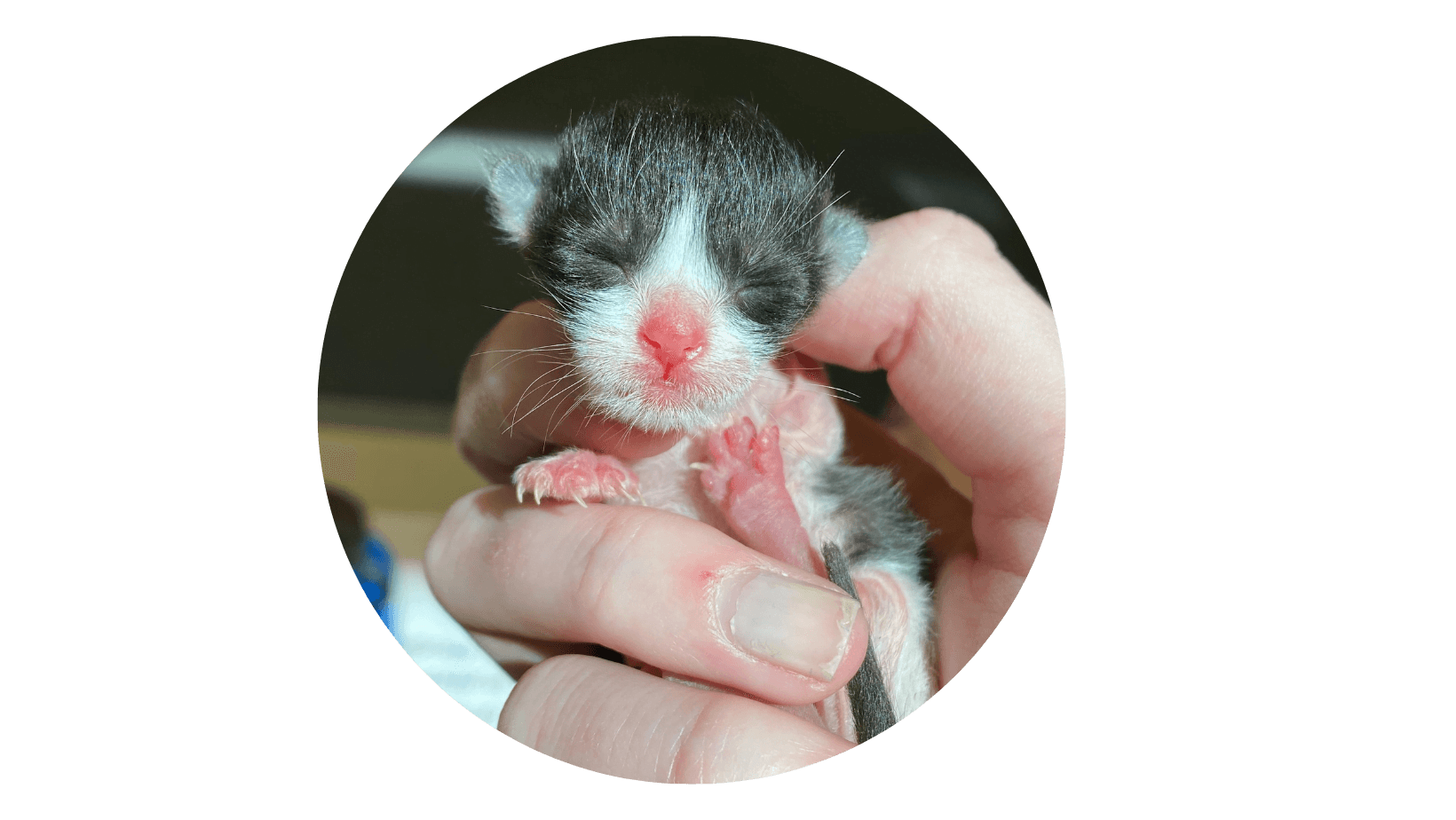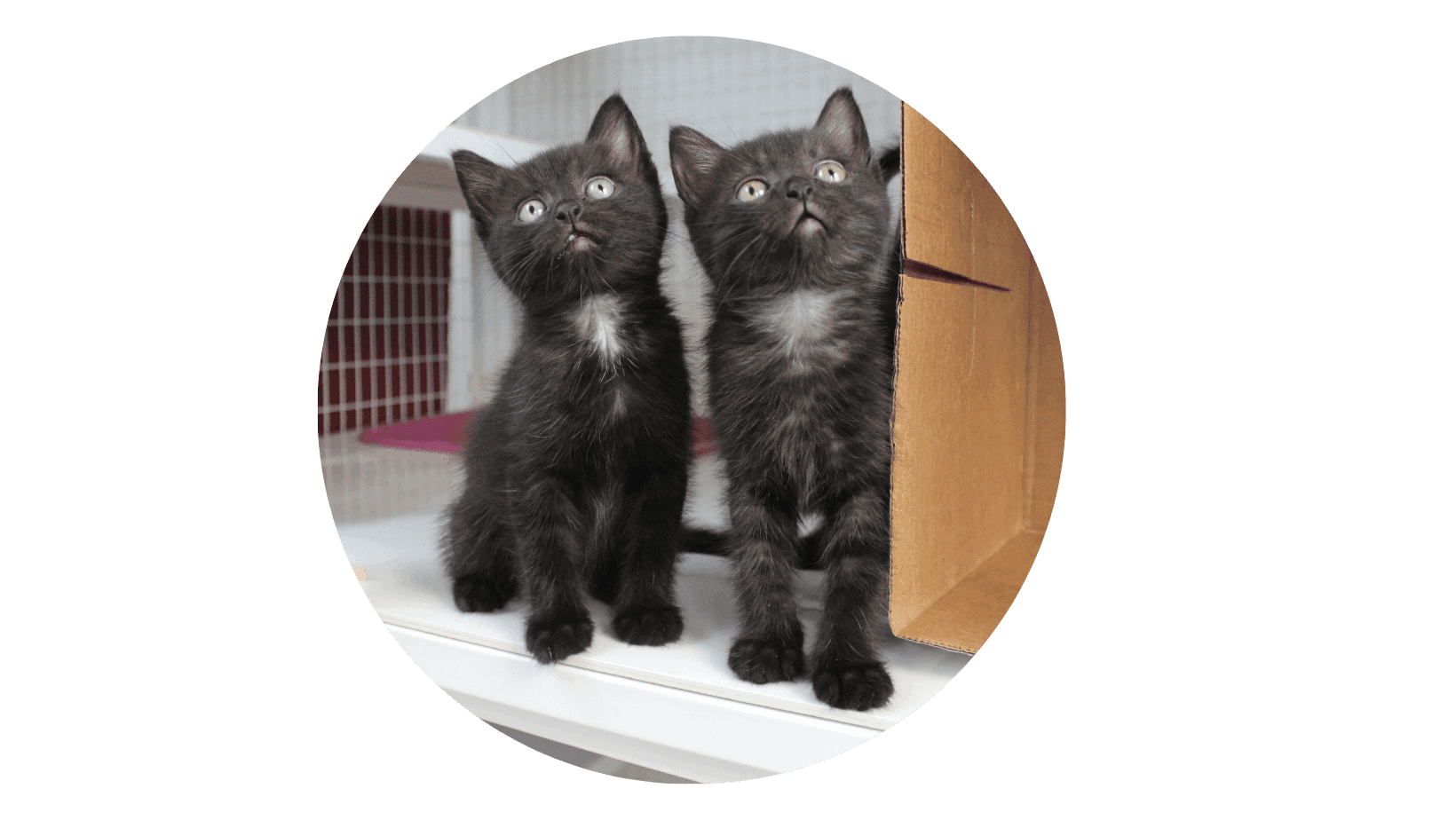Kitten Season
During the warmer months of the year, hundreds of cats reproduce in astronomical numbers. People are finding kittens in bushes, under trailers, inside sheds — and bringing them to our shelter.
While kitten season is undoubtedly the cutest time of year, caring for the constant stream of tiny felines is time consuming, expensive and emotionally taxing.
The good news? You can help save the lives of these kittens! This page contains important information to help you navigate kitten season — whether you’ve found a kitten, are caring for a kitten, or want to help the kittens at Roice-Hurst Humane Society by opening your home or donating toward their care.
I Found a Kitten! What Now?
If you’re an animal lover, your first instinct will likely be to scoop them up and take them to safety. But wait! Assess the situation and make a plan before intervening. Your next step depends on the kitten’s age, condition, and the overall situation. Here’s a basic guide to determine what age group a kitten may be in.

0-5 weeks old
These tiny, uncoordinated kittens are dependent on mom and should stay with her until weaned. Their
eyes may be either closed or blue. These kittens drink milk (or kitten formula) every few hours and need assistance from mom (or a human caretaker) to go potty.

6-11 weeks old
These bouncy, independent kittens are the perfect age to join a foster program! These kittens look and move like an adult cat, just miniature. They will be able to eat solid food on their own and use the litter box independently.

12+ weeks old
If feral, these large, lanky kittens are
difficult to socialize and may need to be Trap-Neuter-Returned if the socialization window has already closed. If friendly, these kittens can join an adoption program.
Once you’ve established the kitten’s age group, your next move depends on a kitten’s condition and situation. If a kitten between the ages of 0-5 weeks old looks to be clean, alert, plump, and not in distress, mom is likely nearby and has been doing a great job! Newborn kittens have the best chance of survival when being cared for by mom. If the kittens are safe where they are and mom is feral, it’s best to simply monitor the family until the babies are weaned around 6 weeks old. At that point, you can bring them home or work with a shelter like Roice-Hurst Humane Society to find placement for them. And don’t forget to get mom spayed! Learn more about our spay/neuter resources.
However, if you find newborn kittens and it’s clear that mom is not coming back, or if kittens of any age are sick, injured, or in danger, it’s time to intervene. When in doubt, contact Roice-Hurst for further instruction and assistance. Please note that our ability to accept kittens is entirely dependent on our availability of foster homes, so consider becoming a foster family to help us care for the kittens! We provide all necessary supplies and veterinary care.
How to Care for a Newborn Kitten
If you’re taking on the immensely rewarding task of raising a bottle baby kitten, your job is to keep the baby warm, clean, pottied, and fed every few hours. Kitten Lady is an incredible resource to learn how to care for kittens of all ages. Below are a few helpful videos to get you started. If you have any questions, please contact Roice-Hurst Humane Society and our team will happily demonstrate proper care.
If helping a newborn kitten make it to their next stage in life sounds like fun to you, become a foster parent! Neonatal kitten fosters are one of our biggest needs during kitten season. With just a few weeks of your time and love, you’ll save a life. How cool is that? Click here to sign up to foster!
Become a Kitten Foster Parent
Bottle babies aren’t the only kind of kittens in need of foster care. There’s a foster kitten for just about every lifestyle! One of our biggest struggles during kitten season is simply finding a place for every kitten that comes through our doors. At the height of kitten season, we can have more than 120 kittens in our system at once. Our shelter simply isn’t big enough to care for them all on-site! That’s where foster families step in.
You can take home bottle baby kittens, weaned kittens, pregnant or nursing mama cats with babies, under-socialized kittens, kittens requiring medical care, or adoptable kittens that simply need a place to stay until their new family finds them! All of these kittens have different time commitments and needs. Learn more about our foster program and the types of pets you can foster in our Foster Orientation video below.
Donate to Help Kittens
If you can’t foster, you can still help the hundreds of kittens that will come through our doors this kitten season by donating money or supplies! Kittens are incredibly resource-intensive. Raising just one litter of bottle baby kittens from birth to adoption can cost close to $1,000 when all supplies and routine veterinary care are added up. Bottle babies require expensive, specialized supplies like kitten formula, kitten bottles, Miracle Nipples, microwavable heating disks, baby wipes, kitchen scales, and eventually cat food, litter, vaccines, and spay/neuter surgery. By donating even just one of these items or making a monetary donation, you’ll reduce the strain on our resources and allow us to help even more kittens this kitten season.

Spay or Neuter Your Cat
We can’t slow the river of kittens without stopping it at the source! If your cat isn’t already spayed or neutered, now is absolutely the time to check that off of your to-do list. As much as we love kittens, we have too many already! If that’s not reason enough, spaying or neutering your pet will reduce unwanted behaviors like yowling, spraying, fighting, escaping, and roaming. It also reduces your pet’s risk of cancer.
If your cat is already fixed, talk to your friends and family to ensure every cat you know is spayed or neutered. It’s estimated that 80% of all kittens born each year are born outdoors to community cats, so if you see or feed a neighborhood stray at home or work, please ensure that cat has been spayed or neutered as well. And if you take a litter of kittens off of the streets to find them good homes, don’t forget to spay/neuter mom and dad!
If you can’t afford the full cost of a spay/neuter procedure at your own veterinarian, Roice-Hurst Humane Society may be able to provide a voucher to lower the cost of surgery. We also have humane cat traps that you may borrow.

